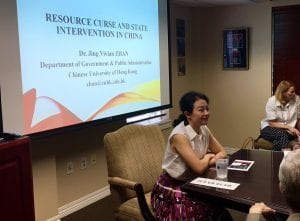
Across the world, the resource curse afflicts numerous resource rich nations. Among them, China struggles to balance the benefits and detriments of its own domestic resources. In this year’s initial colloquium of the Sun & Star Program on Japan and East Asia, Dr. Jing Vivian Zhan of the Chinese University of Hong Kong discussed her own research of the dilemma at the Tower Center event “The Resource Curse in China”. Zhan specializes in Chinese politics, and, more specifically, state-society relations with a particular focus on state intervention in resource affairs. In her talk, Zhan sought to answer two questions: (1) are natural resources a blessing or a curse, and, (2) how do states respond to this problem?
The short answers to these questions are that many resource or mineral rich developing nations struggle with corruption and other repercussions, and the state actively intervenes in resource problems to prevent these possible consequences. The People’s Republic of China in particular, is both an important consumer and producer of minerals and resources; much of Zhan’s research and data comes from the coal mining industry in China. Zhan has conducted interviews across provinces with local officials, citizens, and managers of mining corporations; additionally she has collected a great deal of statistical data from the Chinese government.
Three effects of the resource curse
In answering whether natural resources are a blessing or a curse, Zhan has found that in resource-rich nations the resource curse often has three effects: (1) natural resources discourage human development, (2) natural resources breed corruption, and (3) natural resources arouse social conflict. China has repeatedly been victim to such social conflict. In one example from 2008, there was a major riot of upwards of 20,000 protesters. Zhan noted, on average, most riots are far smaller in scale, and, additionally, that media control is tight. Two specific causes of resource conflicts in China are the environment and the economy. In terms of the environment, air and soil pollution, water shortages, and land subsidence all cause tension. Economic problems include land expropriation, property and road damage, and labor disputes. At the local level, collectively these issues create friction between the residents, coal-mining corporations, and local officials, and at the national level these frictions manifest in the aforementioned societal problems of the resource curse.
State intervention to prevent conflict
In light of these possible consequences, how can a resource-rich nation like China cope with its resource conflicts? Zhan provided two methods by which the state intervenes to prevent such conflict: (1) reactive strategies to individual conflicts, and (2) preemptive strategies for potential conflicts. The reactive strategy is often mediation by local government officials between the mining sector and local citizens. This is done in a way that can almost be referred to as a bargaining system. Yet when mediation fails, the government adorns what Zhan referred to as a “soft face.” This involves the “skillful deployment” of coercive forces to repress protests. The other method by which the Chinese government intercedes, preemptive strategy, entails intervention in dispute prone areas and processes such as selling land. This again involves government led negotiations, but it also provides resource based economic incentives and opportunities. This may require mining corporations to hire a certain percentage of its workers from the local work force, and in this way this “grassroots governance” helps protect local labor. In turn this creates vested interests among locals; in these situations it may even be beneficial for mining to come to your locality. Additionally, the government often helps to redistribute resource wealth through the provision of public goods or social welfare benefits from resource revenue as a way of minimizing local resistance.
Intervention of the Chinese Communist Party
Ultimately, the Chinese government is by no means a passive actor in the PRC’s resource curse. To explain further, Zhan posed the following question: Why does the Chinese state choose to intervene? Simply put, there are incentives for, namely, the Chinese Communist Party (CCP) to remain in power. Since the Tiananmen incident of 1989 it has been one of the utmost goals of the CCP to enforce or maintain social order from the top down. This is materialized through tight personnel control of local officials. Beyond this, the CCP, above all else, strives to stay in power. Displaying its capacity for resource conflict resolution is an important and integral part of maintaining power. The PRC is by no means a totalitarian state, yet the state’s presence in the economy and greater society is extremely well integrated. Even at the lowest level, local governments have a great deal of bargaining power, which allows them to mobilize resources to resolve conflicts.
China faces the resource curse at a subnational level. The Chinese state has actively responded to the resource curse, at least when it threatens regime stability. It has utilized the aforementioned soft strategies, instead of resorting only to hard repression. Therefore, Zhan concluded that there are two necessary conditions for effective state interventions in China’s resource curse: (1) central control over local officials and (2) state penetration into the economy and society.
Listen to Dr. Zhan’s lecture at the Tower Center:
 Claire Huitt is a senior at Southern Methodist University triple majoring in public policy, economics, and political science with a focus on international relations and the Asian Pacific. She is a Bauer Scholar in Political Science, Hamilton Scholar, Engaged Learning Fellow, a representative of IGNITE Women in Politics, Chair on Asian Pacific Relations with the Tower Center Student Forum, Dedman School of Law Pre-Law Scholar, New Century Scholar, and a member of the University Honors Program. After graduation Claire intends to attend law school and pursue a career in international law and foreign affairs.
Claire Huitt is a senior at Southern Methodist University triple majoring in public policy, economics, and political science with a focus on international relations and the Asian Pacific. She is a Bauer Scholar in Political Science, Hamilton Scholar, Engaged Learning Fellow, a representative of IGNITE Women in Politics, Chair on Asian Pacific Relations with the Tower Center Student Forum, Dedman School of Law Pre-Law Scholar, New Century Scholar, and a member of the University Honors Program. After graduation Claire intends to attend law school and pursue a career in international law and foreign affairs.